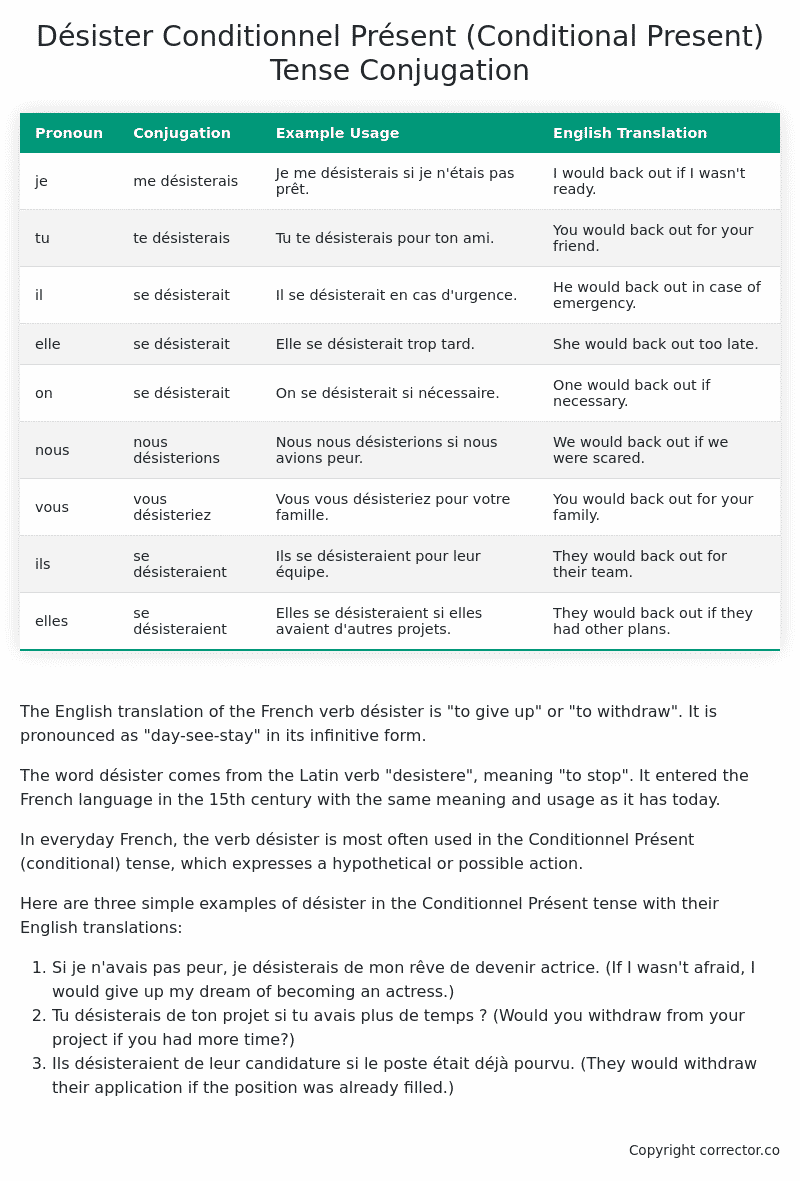Conditionnel Présent (Conditional Present) Tense Conjugation of the French Verb désister
Introduction to the verb désister
The English translation of the French verb désister is “to give up” or “to withdraw”. It is pronounced as “day-see-stay” in its infinitive form.
The word désister comes from the Latin verb “desistere”, meaning “to stop”. It entered the French language in the 15th century with the same meaning and usage as it has today.
In everyday French, the verb désister is most often used in the Conditionnel Présent (conditional) tense, which expresses a hypothetical or possible action.
Here are three simple examples of désister in the Conditionnel Présent tense with their English translations:
- Si je n’avais pas peur, je désisterais de mon rêve de devenir actrice. (If I wasn’t afraid, I would give up my dream of becoming an actress.)
- Tu désisterais de ton projet si tu avais plus de temps ? (Would you withdraw from your project if you had more time?)
- Ils désisteraient de leur candidature si le poste était déjà pourvu. (They would withdraw their application if the position was already filled.)
Table of the Conditionnel Présent (Conditional Present) Tense Conjugation of désister
| Pronoun | Conjugation | Example Usage | English Translation |
|---|---|---|---|
| je | me désisterais | Je me désisterais si je n’étais pas prêt. | I would back out if I wasn’t ready. |
| tu | te désisterais | Tu te désisterais pour ton ami. | You would back out for your friend. |
| il | se désisterait | Il se désisterait en cas d’urgence. | He would back out in case of emergency. |
| elle | se désisterait | Elle se désisterait trop tard. | She would back out too late. |
| on | se désisterait | On se désisterait si nécessaire. | One would back out if necessary. |
| nous | nous désisterions | Nous nous désisterions si nous avions peur. | We would back out if we were scared. |
| vous | vous désisteriez | Vous vous désisteriez pour votre famille. | You would back out for your family. |
| ils | se désisteraient | Ils se désisteraient pour leur équipe. | They would back out for their team. |
| elles | se désisteraient | Elles se désisteraient si elles avaient d’autres projets. | They would back out if they had other plans. |
Other Conjugations for Désister.
Le Present (Present Tense) Conjugation of the French Verb désister
Imparfait (Imperfect) Tense Conjugation of the French Verb désister
Passé Simple (Simple Past) Tense Conjugation of the French Verb désister
Passé Composé (Present Perfect) Tense Conjugation of the French Verb désister
Futur Simple (Simple Future) Tense Conjugation of the French Verb désister
Futur Proche (Near Future) Tense Conjugation of the French Verb désister
Plus-que-parfait (Pluperfect) Tense Conjugation of the French Verb désister
Passé Antérieur (Past Anterior) Tense Conjugation of the French Verb désister
Futur Antérieur (Future Anterior) Tense Conjugation of the French Verb désister
Subjonctif Présent (Subjunctive Present) Tense Conjugation of the French Verb désister
Subjonctif Passé (Subjunctive Past) Tense Conjugation of the French Verb désister
Subjonctif Imparfait (Subjunctive Imperfect) Tense Conjugation of the French Verb désister
Subjonctif Plus-que-parfait (Subjunctive Pluperfect) Tense Conjugation of the French Verb désister
Conditionnel Présent (Conditional Present) Tense Conjugation of the French Verb désister (this article)
Conditionnel Passé (Conditional Past) Tense Conjugation of the French Verb désister
L’impératif Présent (Imperative Present) Tense Conjugation of the French Verb désister
L’infinitif Présent (Infinitive Present) Tense Conjugation of the French Verb désister
Struggling with French verbs or the language in general? Why not use our free French Grammar Checker – no registration required!
Get a FREE Download Study Sheet of this Conjugation 🔥
Simply right click the image below, click “save image” and get your free reference for the désister Conditionnel Présent tense conjugation!

Désister – About the French Conditionnel Présent (Conditional Present) Tense
Formation
Common Everyday Usage Patterns
Expressing Polite Requests
Expressing Hypothetical Situations
Expressing Doubt or Uncertainty
Interactions with Other Tenses
Present Tense
Past Tense
Future Tense
Conditional Perfect
Summary
Want More?
I hope you enjoyed this article on the verb désister. Still in a learning mood? Check out another TOTALLY random French verb conjugation!


